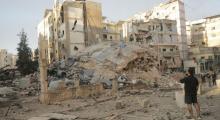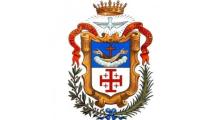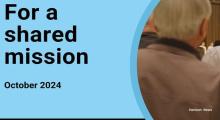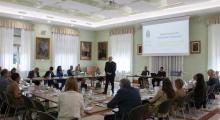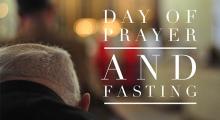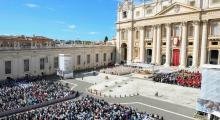Issued by the Catholic Center for Studies and Media - Jordan. Editor-in-chief Fr. Rif'at Bader - موقع أبونا abouna.org
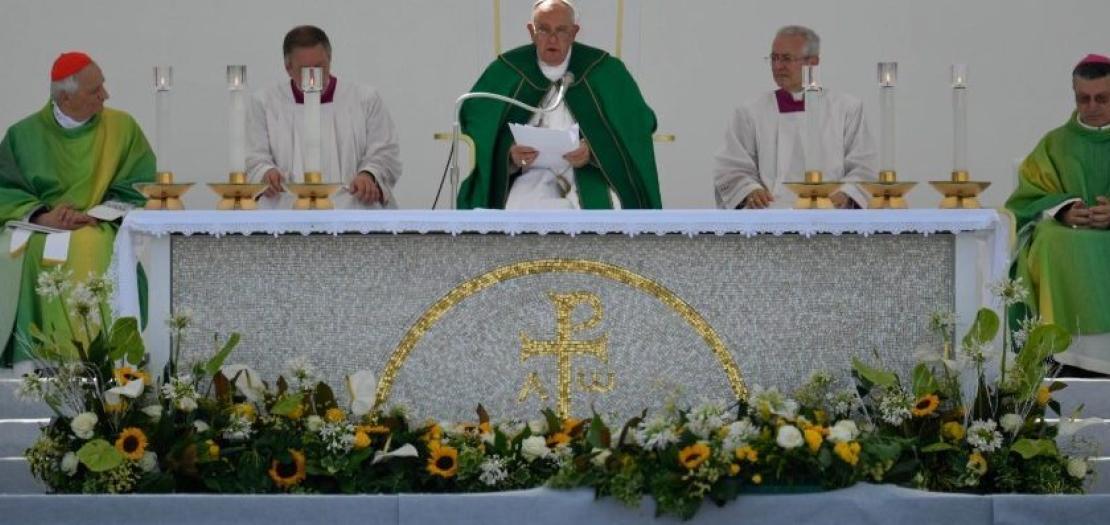
What the world needs now is “the scandal of faith,” Pope Francis said during his homily for Mass on Sunday, July 7, which he concelebrated in the Italian city of Trieste to mark the conclusion of the Italian Catholic Social Week.
The Holy Father began his reflection by noting that Lord Jesus Himself was rejected by His own countrymen, precisely because of His humanity. They saw only His ordinary life as “the son of Joseph the carpenter,” and could not understand the source of His wisdom and His miracles.
A strong and powerful God is understandable and attractive, the Pope said. But a God Who is weak, even to the point of dying on the Cross; a God Who challenges us to life for others, as Jesus did, is an “uncomfortable God” that troubles and scandalizes us.
But it is precisely this “scandal of faith” that is needed today, Pope Francis said. “We need a scandal of faith” that is not indifferent to the problems of this world, but that is rooted in the Incarnation, a faith “that enters history, touches people’s lives, and becomes a leaven of hope and a seed for a new world.”
Pope Francis insisted that God is found is precisely “in the dark corners of our lives and of our cities,” and among “the least, the forgotten, the discarded.”
All too often, he said, we are scandalized by little things, when instead we should be outraged “in the face of rampant evil, of life being humiliated,” scandalized by the plight of migrants and prisoners.
Like Jesus--Who, despite being rejected and even tried and executed, “remained faithful to His mission”--we Christians are also called to be prophets and witnesses to the Kingdom of God, in whatever place or situation we find ourselves.
“Let us not be scandalized by Jesus but, on the contrary, let us be indignant at all those situations where life is degraded, wounded, and killed.”
“Let us not be scandalized by Jesus but, on the contrary, let us be indignant at all those situations where life is degraded, wounded, and killed,” the Pope pleaded. “Let us bring the prophecy of the Gospel into our flesh, by our choices even before our words.”
And, in a special appeal to the Church in Trieste, Pope Francis called on the faithful, “Go forward! Continue to be on the front line to spread the Gospel of hope, especially towards those arriving from the Balkan route and towards all those who, in body or spirit, need to be encouraged and comforted.”
Pope Francis concluded his homily with an appeal to everyone to commit to work together, in the realization that we are all loved by God the Father, in order to live as brothers and sisters to everyone.
Pope in Trieste: Catholics called to heal ‘wounded heart’ of democracy
On the final day of the annual Italian Catholic Social Week, Pope Francis traveled to the northern Italian city of Trieste on Sunday to share his thoughts on the crisis of democracy.
Speaking to over 900 delegates from dioceses and associations across Italy, the Pope appealed for a democratic process that engages personal and community involvement.
In his address, he recalled that the first Italian Catholic Social Week was held in 1907 and that later editions helped galvanize the Italian democratic process after World War II.
The annual event, which was restarted in 1988, draws on the Social Doctrine of the Church and seeks to offer a Gospel vision of social phenomena.
“Just as the crisis of democracy crosses various realities and Nations,” he said, “so too does the attitude of responsibility towards social transformations call all Christians, wherever they live and work, in every part of the world.”
Pope Francis then offered an image of the crisis of democracy as “a wounded heart,” in which corruption and social exclusion can abound and power becomes self-referential and incapable of serving its constituents.
“The very word ‘democracy’ does not simply coincide with the vote of the people but requires creating the conditions for everyone to express themselves and participate,” he said.
Democratic participation, he added, must be instilled at a young age, so that citizens embrace a critical sense “regarding ideological and populist temptations.”
The Pope called on Christians to promote a fruitful dialogue between religion and society, while upholding the dignity of the person.
“The principles of solidarity and subsidiarity,” he said, help build the bonds of democracy, since they encourage participation and overcome indifference, which he said is “a cancer of democracy.”
The Pope went on to uphold the goal of democratic participation with the image of a “healed heart.”
“If we look around,” he said, “we see many signs of the Holy Spirit's action in the lives of families and communities, even in the fields of economics, technology, politics, and society.”
Fraternity, added Pope Francis, “makes social relationships flourish,” and engenders a spirit of collective aspiration.
“A democracy with a healed heart,” he said, “continues to cultivate dreams for the future, engages, and calls for personal and community involvement.”
Catholics, said the Pope, must look beyond quick fixes for democracy’s ills and never retreat into a “marginal or private faith.”
“This means not so much demanding to be heard,” he said, “but above all having the courage to make proposals on behalf of justice and peace in the public debate.”
Christian engagement in politics must take on the aspects of “political love” or “political charity,” which allows politics to “rise to its responsibilities and move beyond polarizations”.
“Let us train ourselves in this love to circulate it in a world short of civil passion,” concluded Pope Francis. “Let us learn to better walk together as God's people, to be leaven of participation among the people to which we belong.”


